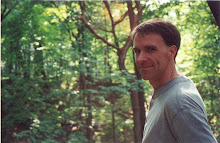
Local Hopper wanna-bes might have a studio at the Blue Star Arts Complex, a pair of narrow warehouses carved up and adapted into artists' spaces, separated by a narrow tract of crumbling, weed-poked asphalt. I found a gallery owner named Joan, sixtyish, with moussed gray hair, green eyes, a big Irish nose, and bright red lipstick. She broke off her conversation with an associate and set aside an oversized pot of large red flowers on a big square glass coffee table so that we could see each other as we sat in chrome tube and leather Marcel Breuer chairs. 
"I think," Joan cooed, "isolation has more to do with who you know. Thinking about my neighbors: he's a retired doctor from Mexico. She's from New York. They stay in their home all the time. You never see them. My other neighbor says maybe she's buried in the back yard. But that's the way their life is. It's extremely isolated. But that's their choice.
"The other thing is that we have a high population of Mexican-Americans. And they certainly are not isolated people. They embrace. They are very family-oriented and party-oriented. I always say about San Antonio, 'we don't need an excuse to have a party.' We have a fiesta all the time. And that has a lot to do with the city having so much Mexican culture."
To my question referencing Nighthawks, her associate Rick jumped in, "Oh yes, where you're looking through a glass window, right?" Rick was a wiry bundle of energy with thick hairy forearms. He was draped in a gray sweater and gray wool socks with brown loafers. Avid green eyes peered out from his constantly-moving head. "Are we as isolated as that, in character? You could maybe say that. But there's a small group of people in this city that aren't isolated. People have a tendency to call San Antonio a large small town. There are people that are very worldly, that have traveled and are very well educated. But it's a minority."
"I was in Dallas," Rick continued. "Living in Dallas and seeing all the culture that is offered to the citizens, and then coming home to San Antonio, it's kind of a shock. I think this city protects itself from what's going on in other cities, which could be viewed as isolating itself. In Dallas, you're always meeting new and interesting people. Here you can, but it's not as easy. The way I describe San Antonio is it's always slow to react to anything, any trend. I think a lot of people [here] are military and that's conservative." 
"Hm," Joan frowned. "That's interesting. I've never connected it to retired military. I always connected it to a cow town. Not a cow town but ranching. It's just a different way of life. You have a lot of people with ranches. And oil. And you have hidden little treasures, and they really don't know what they've got. They don't even know what they're worth here in this city."
Rick barreled on, "We have a lot of blue-collar business. So there are a lot of neighborhoods within this otherwise tourist city. And the industry here isn't like what you see in other large cities. Southwest Bell moved their headquarters here, and moved a lot of people in from Kansas City or wherever. And those people are moving back because the city doesn't have enough to offer them. One guy that moved here from L.A. I knew personally, and he said, 'Where is the stuff I was enjoying in a bigger city?'"
20090415
214 San Antonio, TX: Blue Star
Subscribe to:
Post Comments (Atom)




No comments:
Post a Comment